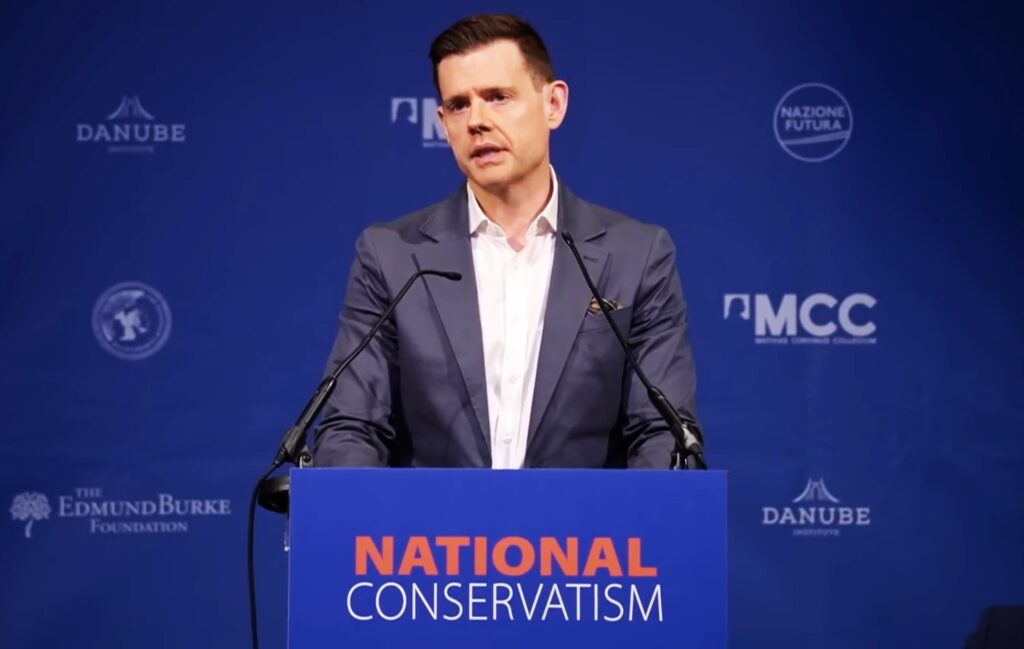In March 2025, Calgary lawyer Jeffrey Rath appeared on “Fox & Friends” to declare that Alberta is “fed up” with Ottawa. Frustrated by the carbon tax and equalization payments that Alberta makes to other provinces, Rath said Albertans are exploring independence or even thinking about joining the United States.
The cowboy-hat-clad self-described “constitutional litigator,” has an X bio that boasts he is a legal advocate with 20-plus years championing First Nations’ rights in Canada.
Rath told “Fox and Friends” that he is a part of “hundreds of interested Albertans” who want to head down to Washington “to explore the benefits of either Alberta becoming an independent sovereign nation with economic union to the United States, becoming a U.S. territory, or pursuing full statehood.”
Subscribe to our newsletter
Stay up to date with DeSmog news and alerts
Rath also said that Albertans had more in common with people in Montana than Eastern Canada.
He is among a group of fringe separatists reviving decades-old Western alienation rhetoric with a new American spin, presenting Alberta as a potential 51st state at a time when President Donald Trump has made frequent inflammatory comments about annexing Canada.
He is also the lawyer for the separatist group the Alberta Prosperity Project. His proposal? A petrostate founded on resource sovereignty and the promise of low taxes.
“I’m 100 per cent in favour of Alberta statehood,” Rath told Rebel News founder Ezra Levant in a recent interview. His vision includes a “Commonwealth of Alberta”, a sovereign nation stripped of federal income tax, carbon pricing, and any regulatory link to Ottawa.
In an open letter titled Alberta Wants Out, Rath outlined a plan to eliminate federal taxation and reinvest Alberta’s oil wealth into local infrastructure and social programs provided those initiatives follow his ideology of independence and deregulation.
While Rath’s vision is far from mainstream, it reflects an undercurrent of resentment in Alberta politics. A new Angus Reid Institute poll suggests that 19 per cent of Albertans would vote to leave Canada. Another 17 per cent of respondents say they’re leaning that way. Still, more than half of respondents would vote to remain in the country.
DeSmog reached out to Rath for comment but didn’t receive a response.
Indigenous leaders are not impressed with the discussion
On May 2, Athabasca Chipewyan First Nation (ACFN) Chief Allan Adam issued a firm reminder that Indigenous Nations, not provinces, are parties to Canada’s founding treaties. “Alberta’s current public discourse about separating from Canada fundamentally conflicts with our inherent and constitutionally protected Treaty 8 rights,” Chief Adam said in a written press release.
Signed in 1899, Treaty 8 is a nation-to-nation agreement between First Nations and the Crown that predates Alberta’s existence. It guarantees the right to hunt, fish, trap and live on the land — rights that would not simply dissolve in the event of Alberta leaving Confederation.
“Alberta has no authority to alter or negate these solemn agreements,” Chief Adam said. “No provincial legislation or referendum can extinguish or rewrite our Treaty rights.”
While politicians and commentators like Rath talk about independence as a matter of provincial will, ACFN’s leadership is clear: Indigenous consent is required.
“These treaties are international in nature,” the statement continues. “Any move toward altering Alberta’s status without our Nation’s consultation and consent would violate our inherent rights.”
In response to Adam, Rebel Media writer Sheila Gunn Reid called him a “foreign-funded prop, a Hollywood handler’s dream, and a man who has repeatedly attacked Alberta’s interests for profit and press.”
Petro-nationalism finds new leadership
Leading the charge on the separatism organization is Mitch Sylvestre, CEO of the Alberta Prosperity Project (APP), who also serves as president of the Bonnyville-Cold Lake-St. Paul United Conservative Party constituency association.
Sylvestre chaired the Alberta First Pension Plan initiative under the APP, advocating for Alberta to break from the Canada Pension Plan and form its own. Premier Danielle Smith has put the plan on hold for the time being, saying at a press conference that there is “no appetite” for a provincial pension.
Smith has offered tacit support for pieces of the APP’s platform, but is cautious when pressed on the full separatist agenda. At an unrelated news conference in May, Smith dismissed questions about APP’s petition strategy as premature.
“Having people sign up on a website saying that they will ultimately sign a petition is one thing,” Smith said. “Getting the physical signatures signed up is another. That’s why we have to wait for the process to play out.”
Legal troubles
While Rath positions himself as a rights crusader his legal history tells a more complicated story, particularly in relation to the First Nations he claims to champion.
In one case, Sturgeon Lake Cree Nation challenged a $28.5 million contingency fee Rath collected from a $142.7 million Treaty 8 settlement. The Nation argued that Rath’s agreement violated Rule 10.7 of Alberta’s Rules of Court.
In 2023, Justice C.D. Simard agreed, declaring the fee agreement unenforceable due to serious procedural and documentation issues.
In a separate matter, Sweetgrass First Nation disputed Rath & Company’s billing. A 2012 review officer reduced the firm’s charges by 55 per cent. When Rath appealed, the Court found that the review officer had exceeded its jurisdiction in interpreting retainer agreements and ordered a new review while also casting doubt on the rationale behind the billing in the first place.
American influence
Alberta’s independence rhetoric isn’t staying north of the 49th parallel. It has captured the interest of American right-wing media.
Media figures like David Krayden, writing for The Blaze — the Glenn Beck-founded conservative outlet — have amplified Rath’s talking points, framing Alberta’s oil wealth as the key to freedom from federal overreach.
“If Canada won’t take Donald Trump up on his offer to become the 51st state, one Canadian has a counteroffer: What about just Alberta?” Krayden wrote in March.
The popular Fox News show, “The Five” has also expressed an interest in Alberta. Its co-host Jesse Watters, a conservative commentator and climate change denier, spoke about the province after Prime Minister Mark Carney visited with U.S President Donald Trump.
“I think we want Alberta, because they’re the powerhouse,” he said. “They have all the oil, they have all the minerals. … They’re also conservative in Alberta, so it’s not a great, beautiful line like what you’d see (as a combined Canada with the U.S.) but it would just kind of look like a big Florida that would shoot up north. But it would give us access to the Arctic,” said Watters.
Critics argue that the growing separatist movement draws on old Western alienation themes but is increasingly “Maple MAGA”— a Canadian version of the right-wing Trump movement fostered by supporters of Smith’s United Conservative Party.
“This anti-Ottawa strategy has worked so well that when Trump floated the idea of turning Canada into the ‘51st state,’ many of the UCP’s base — already primed to see the federal government as the enemy — began to view separation from Canada as the next logical step in defending Alberta’s interests,” Gil McGowan, president of the Alberta Federation of Labour, wrote recently in Jacobin.
The language, according to such critics, has shifted from confederation fairness to free-market fantasy. And the way to achieve that goal, argues Rath and his allies, lies in shedding national obligations and doubling down on fossil fuels.
Subscribe to our newsletter
Stay up to date with DeSmog news and alerts






